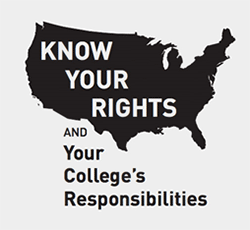Title IX Rights

Discrimination under Title IX includes sexual harassment, gender-based discrimination, and sexual violence. Sexual violence is attempted or completed rape or sexual assault, as well as sexual harassment, stalking, voyeurism, exhibitionism, verbal or physical sexuality-based threats or abuse, and intimate partner violence. If reported, every school must take immediate action whether the incident occurred on or off campus property.
9 Things to Know About Title IX
- Title IX is a civil right that prohibits sex discrimination in education.
- Title IX applies to all students regardless of gender identity.
- Schools may not retaliate against someone filing a complaint and must keep complainants safe from other retaliatory harassment.
- Schools should ensure that no student has to share campus spaces (such as dorms, classes, and workplaces) with their abuser.
- Schools can issue no-contact directives to prevent accused students from approaching or ineracting with you.
- Schools must be proactive in ensuring that your campus is free from sex discrimination.
- Schools cannot discourage you from continuing your education.
- All schools receiving federal funding, including public K-12 schools and the majority of colleges, are subject to Title IX.
- Schools must have an established procedure for handling complaints of sexual discrimination, harassment, and violence.
History of Title IX
Title IX, Education Amendments, 1972
Title IX was made into law in 1972, which prohibits sex discrimination in education. Title IX is a federal civil right held under the Department of Education and the Office of Civil Rights
The Clery Act, 1990
The Clery Act was named after Jeanne Clery, a young woman who was raped and murdered in her dorm room by a fellow student on April 5, 1986. In her memory, her parents championed the Jeanne Clery Disclosure of Campus Security Policy and Crime Statistics. Colleges and Universities are held to a new standard of transparency, which mandates that all crimes that occur on campus are reported and open for the public to see. This Act is a federal law that requires colleges to report crimes that occur “on campus” and school safety policies. This information is available each year in an Annual Security Report (ASR), which can be found on your school’s website. The Clery Act also requires schools to send timely warnings to the school community when there are known risks to public safety on campus.
Violence Against Women Act (VAWA), 1994
VAWA is a landmark piece of legislation that sought to improve criminal justice and community based responses to domestic violence, dating violence, sexual assault and stalking in the United States. Over the last decade, several local, state and national laws have changed to combat interpersonal violence.
Dear Colleague Letter, 2011
Recognizing that sexual violence on college campuses had become an epidemic, the Office of Civil Rights (OCR) and the Department of Education recommended that all schools must implement prevention education programs to students, faculty, and staff regarding interpersonal violence. The letter also provided guidance on the unique concerns that arise in sexual violence cases, including the roles and responsibilities to investigate and address sexual violence and potential consequences of violating these new policies.
The Campus Save Act, 2013
Although the Dear College Letter started the movement for addressing policies and procedures regarding interpersonal violence, it was merely a recommendation. The Campus Save Act is an amendment to the Clery Act, which mandates that schools offer extensive primary prevention and awareness programs, reporting and response for acts of interpersonal violence. Schools must educate students, faculty and staff on prevention and response of rape, acquaintance rape, domestic violence, dating violence, sexual assault, and stalking.

